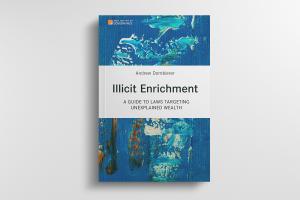Illicit Enrichment: A Guide to Laws Targeting Unexplained Wealth – new book published by Basel Institute on Governance
A new open-access book explores the rapid growth of illicit enrichment legislation around the world and its use to target corruption and recover stolen assets.
BASEL, SWITZERLAND, June 9, 2021 /EINPresswire.com/ -- A new open-access book published by the Basel Institute on Governance explores the rapid growth of illicit enrichment legislation around the world and its use to target corruption and recover illicitly obtained assets.An increasing number of countries are introducing illicit enrichment or unexplained wealth laws – mechanisms to target people who enjoy an amount of wealth that can't be explained by their lawful income.
These mechanisms allow investigators and prosecutors to recover assets that have clearly not come from lawful sources without having to prove the specific criminal action that gave rise to these proceeds.
To support practitioners and policy makers in this emerging field of law, Illicit Enrichment by Andrew Dornbierer provides a comprehensive guide to both criminal and civil-based illicit enrichment laws and how they have been applied by investigators and prosecutors to target unexplained wealth and recover proceeds of crime.
Covering relevant laws from around the world, the book explains the different approaches that legislators have taken to define, codify and sanction unjustifiable and unexplainable increases in wealth. The scope ranges from laws that take the form of criminal offences to those based solely in civil procedure, such as unexplained wealth orders.
Through an extensive examination of jurisprudence, the book further explains the different approaches and interpretations that judiciaries have taken when applying these laws, particularly in the context of existing legal rights.
Aimed at investigators, prosecutors, legislators and academics, the open-access book features:
- Extensive analysis of jurisprudence and cases around the world
- Tables, flow charts and graphics explaining key concepts
- Discussion of common questions and challenges
- A collection of laws from 103 jurisdictions, also as an online database
- A step-by-step guide to financial investigation and source and application analysis to support illicit enrichment cases
Illicit Enrichment was developed and published by the Basel Institute on Governance through its International Centre for Asset Recovery, with research support from the NYU School of Law.
This book is freely available and shareable as an open-access research publication under a Creative Commons CC BY-NC-ND 4.0 licence.
In line with accepted practice for open-access research, the book has undergone an open peer review with three diverse and highly qualified reviewers.
Read Illicit Enrichment online or download a PDF of the book on our Basel LEARN platform at illicitenrichment.baselgovernance.org. This version also contains:
-> Annex I: A database of illicit enrichment laws in 103 jurisdictions, also available as a PDF
-> Annex II: Guidance for practitioners on how to conduct source and application analysis to support illicit enrichment cases
Find more information and links to the print version of Illicit Enrichment here.
If you're interested in hearing from the book's author Andrew Dornbierer and practitioners experienced in applying this legislation to recover stolen assets in their countries, join us on 30 June at 13:00 CET for a virtual event on Illicit enrichment laws – an underused tool to target corruption and recover stolen assets?
Basel Institute on Governance
Basel Institute on Governance
+ +41 61 205 55 11
info@baselgovernance.org
Visit us on social media:
Twitter
LinkedIn
Legal Disclaimer:
EIN Presswire provides this news content "as is" without warranty of any kind. We do not accept any responsibility or liability for the accuracy, content, images, videos, licenses, completeness, legality, or reliability of the information contained in this article. If you have any complaints or copyright issues related to this article, kindly contact the author above.

